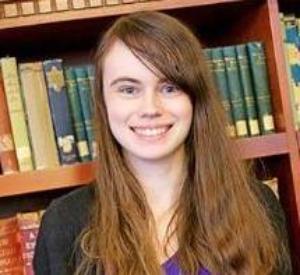
At a larger university, the research assistant job I’ve had the past two years might have gone to a graduate student. But at St. Thomas, it went to me.
Because of this opportunity, I’ve been able to apply my English degree to practical projects, learn new skills, and discover a whole field of literature I hadn’t previously known existed.
During my time at St. Thomas, I’ve been lucky enough to work with a professor on two research projects: the New Brunswick Literary Encyclopedia, an online resource of mostly student-written entries about the province’s authors, and the New Brunswick Literature Curriculum in English, a curriculum focused entirely on the province’s literature.
Engaging in Professional Research, Editing, and Writing
As a research assistant, I helped edit and publish new entries to the Encyclopedia. Most of the entries are written by students—I’ve actually written two myself: one about a UNB-affiliated writing group called the Ice House Gang, and one about country songwriter Stompin’ Tom Connors.
I, and many other students, have written these entries in lieu of essays for course credit. Instead of writing a paper that only the professor will read, we learn how to do archival research, work with an editor on several drafts, and create an article that others can use in their own research.
Helping New Brunswickers Discover their Literature
I later spent two summers working on the Curriculum. The Curriculum’s goal is to help New Brunswickers discover their literature, which is under-studied and under-appreciated. Instead of being a tool solely for educators, the whole curriculum has been placed on its own website and is available for free.
My job when I joined the project was to proofread, contribute a bit of writing as necessary, and populate the Curriculum to its website.
It was a lot of work—I thoroughly proofread the more-than-600 page document, and I made so many calls to IT services—but, I learned so much while working on these projects, like how the editing process works from the editor’s perspective and how to use web publishing software.
And, of course, I got to work on some projects I cared about. I’m not a New Brunswicker (I’m from Prince Edward Island), but many of the issues addressed in New Brunswick literature (e.g. economic hardship, social inequality, and outmigration) are similar to the problems we struggle with in my own province. It was kind of amazing to realize these novels and poems not only existed, but that they mattered.
Thanks to these experiences and skills, I’ve got a whole pile of great literature on my “must read” list (like Elizabeth Brewster, Antonine Maillet, and Herménégilde Chiasson), and I’m considering enrolling in a publishing program when I finish my Bachelor of Arts.
-(2).jpg)